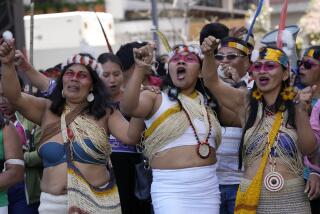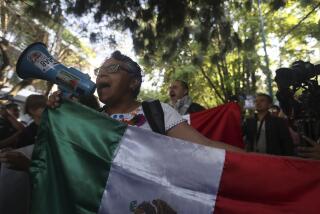No Peace Between Peru, Ecuador : Latin America: Fighting on the border and at the negotiating table continues for the two neighboring nations.
- Share via
QUITO, Ecuador — After a week of armed conflict on their border, Ecuador and Peru engaged in new skirmishes Thursday--both in the combat zone and in negotiations for a cease-fire agreement.
Ecuador’s armed forces reported that troops and helicopters attacked its border posts in the remote and rugged area known as Cordillera del Condor. Peru’s top general also reported fighting, saying his forces had ejected Ecuadorean forces from a camp “in Peruvian territory.”
In Rio de Janeiro, where the United States and three other countries are trying to help negotiate an end to hostilities, Ecuadorean and Peruvian diplomats insisted on conflicting terms for a cease-fire. The talks were expected to continue today.
In Washington, President Clinton urged an immediate cease-fire agreement. In a letter to Presidents Alberto Fujimori of Peru and Sixto Duran-Ballen of Ecuador, Clinton called the hostilities a tragedy for both sides, White House spokesman Mike McCurry said late Thursday.
Fujimori suspended his scheduled departure for a long-planned summit in Venezuela, where Duran Ballen expressed willingness to meet with him.
“I still hope to be able to sit down to talk with President Fujimori, but I can hardly do it with someone who is turning his back on me,” Duran Ballen said in a news conference.
The meeting of the presidents of Bolivia, Colombia, Ecuador, Panama and Venezuela was scheduled to continue today.
Duran Ballen said Ecuador cannot accept any proposal that would mean abandoning positions occupied by Ecuador for years. That appeared to be a major sticking point in the Rio negotiations, mediated by the United States, Brazil, Argentina and Chile.
The Peruvian and Ecuadorean deputy foreign ministers participating in the Rio meeting have disagreed on terms of a draft agreement that calls for a demilitarized zone in the disputed border area.
While the Rio talks proceeded Thursday, the Ecuadorean armed forces reported that “starting at 9 a.m., combat was renewed in the zone of conflict.” It said five Ecuadorean bases were under attack by Peruvian troops, armed helicopters and mortar fire.
But Gen. Nicolas Hermoza, head of Peru’s armed forces, said in a broadcast message that Peruvian troops had “definitively dislodged” Ecuador’s troops from a base called Sur and were advancing in a “final move” to take another base called Tihuinza.
Ecuador claims that both bases have been established for years in Ecuadorean territory, and it denied Thursday that it had lost any positions.
Hermoza also said that, in the last week, six Peruvian servicemen and 43 Ecuadoreans were killed in action. That death toll was denied by Ecuador, which officially has acknowledged losing seven soldiers.
Peruvian and Ecuadorean forces have clashed almost daily for the last week along a 48-mile stretch of disputed border that runs through mountains laced with rivers and covered with tropical forest. The fighting has been the worst since a border war between the two countries in 1941.
The four countries mediating the talks in Rio were the “guarantors” of a 1942 pact that was intended to settle the border dispute. The pact has not prevented numerous armed clashes and other incidents through the years.
The mediated talks began Tuesday at the Palacio do Itamaraty, where the 1942 pact was negotiated. Thursday, for the first time in the current talks, the delegates from Peru and Ecuador agreed to sit at the same negotiating table.
Yet, despite much cajoling by the mediator, no agreement was in sight Thursday night.
Late in the afternoon, Sebastiao do Rego Barros, Brazil’s deputy foreign minister, emerged in shirt-sleeves to report to news media on the meeting. The mediating countries, he said, were examining two new counterproposals for peace from Lima and Quito.
Rego Barros declined to comment on the content of the two proposals, saying that revealing details could hamper the diplomatic efforts. “Each carried a series of technical, diplomatic and political implications” that deserved careful examination, he said.
Times staff writer Long reported from Quito and special correspondent Margolis from Rio de Janeiro. Special correspondent Adriana von Hagen in Lima contributed to this report.
More to Read
Sign up for Essential California
The most important California stories and recommendations in your inbox every morning.
You may occasionally receive promotional content from the Los Angeles Times.










